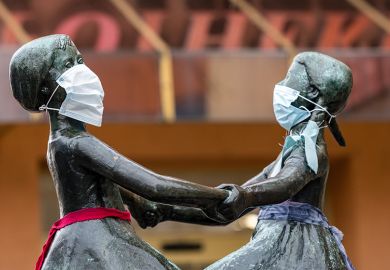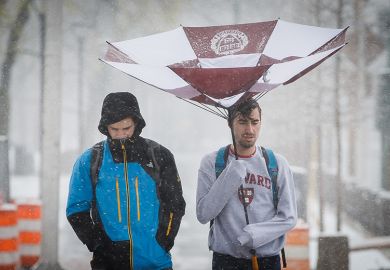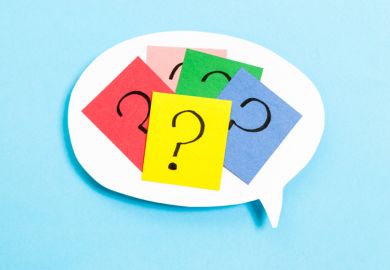Medical ethicists have a crucial role to play in helping healthcare workers to think through, and to manage emotionally, the dilemmas they face during the coronavirus crisis, according to a leading professor in the discipline.
Deborah Bowman, professor of bioethics, clinical ethics and medical law – and deputy principal (institutional affairs) – at St George’s, University of London, told Times Higher Education that national responses to Covid-19 have raised big ethical questions around “balancing civil liberties with compulsion; individual rights with the public interest”.
Her university is co-located with a large acute National Health Service trust, and Professor Bowman – a prominent media commentator on medical ethics as well as author of books including The Worried Student’s Guide to Medical Ethics and Law – has been working with clinicians across London and beyond to provide clinical ethics support as well as chairing a clinical ethics committee at a large NHS mental health trust.
Many healthcare workers, Professor Bowman said, were experiencing “moral distress”: for example, about “end-of-life care and contact that they were no longer able easily to provide, in terms of relatives visiting, touch – very basic human things we take for granted”.
As a clinical ethicist, she hoped to “provide a space where somebody can have these conversations and voice their concerns…We provide a structure and a range of tools, models and approaches that bring a consistency and coherence to approaching dilemmas that can seem very overwhelming”.
Expanding on the work of clinical ethicists, Professor Bowman said: “We have a role in building confidence and expertise, modelling how to approach an ethical question in a way that is considered, structured and takes account of core theories without necessarily calling them theories. You’d be unlikely to talk about Aristotle’s theory of virtues! It’s not like a seminar where you would expect to be digging into the text [of a major philosopher].
“It’s got to be more than a talking shop, particularly at the moment, when the pressures are huge, time is short and the stakes are high.”
Personal experience has added another dimension to Professor Bowman’s thinking because she herself has cancer and is taking immunosuppressants, meaning that she is at higher risk from the new coronavirus. She has, therefore, been isolating since March, with “a 22-year-old son who wants to go out and volunteer and do all sorts of other things”.
This has raised what she called “a classical ethical question of individual and collective rights” – “weighing not only the experiences of the people that [her son] would work with [at a food bank] but his interests as a young person wanting to be out and about playing his role in society, versus being at home with a mum who doesn’t need looking after in any practical sense”.
“That’s why I find my discipline so fascinating even after 28 years or whatever of practising it,” reflected Professor Bowman, “because you’re never done [by finding a definitive answer]. Covid and how we’ve experienced it in my house has been a new manifestation of that.”
Despite her own medical condition, Professor Bowman did not “feel like a vulnerable person or a drain on society – I think I’m pretty functional and working very hard to do all sorts of things that are valuable”. And this had alerted her to the way that certain groups can get stereotyped or “othered”.
“I am always struck by the phrase ‘underlying health conditions’ when somebody dies,” she said, “because of the inference that they were of another category to the healthy norm. Anything that characterises people by illness or diagnosis is worth interrogating. It risks sounding as if people are dispensable because they fall within a particular category – that sets my ethical antennae twitching!”
Such thinking can need challenging, in Professor Bowman’s view, particularly among medical students, who are just “learning about pathology and categorisation, so it’s not surprising when that frame of thinking spills over. But they may sometimes make assumptions about particular groups of patients.”
So do we need more moral philosophers to step forward and work alongside clinicians?
“I don’t think this is something you want to be dabbling in during a pandemic for the first time,” replied Professor Bowman. “You need strong relationships with clinical teams and to understand how the system works.
“Clinical ethicists need to be able to do very different [things] from the standard things you’d expect an academic ethicist to do. A beautifully crafted argument will get you only so far in that context. I certainly don’t think we should be having mass conscription of ethicists.”
POSTSCRIPT:
Print headline: Ethical tools can help health workers tackling Covid-19
Register to continue
Why register?
- Registration is free and only takes a moment
- Once registered, you can read 3 articles a month
- Sign up for our newsletter
Subscribe
Or subscribe for unlimited access to:
- Unlimited access to news, views, insights & reviews
- Digital editions
- Digital access to THE’s university and college rankings analysis
Already registered or a current subscriber?








